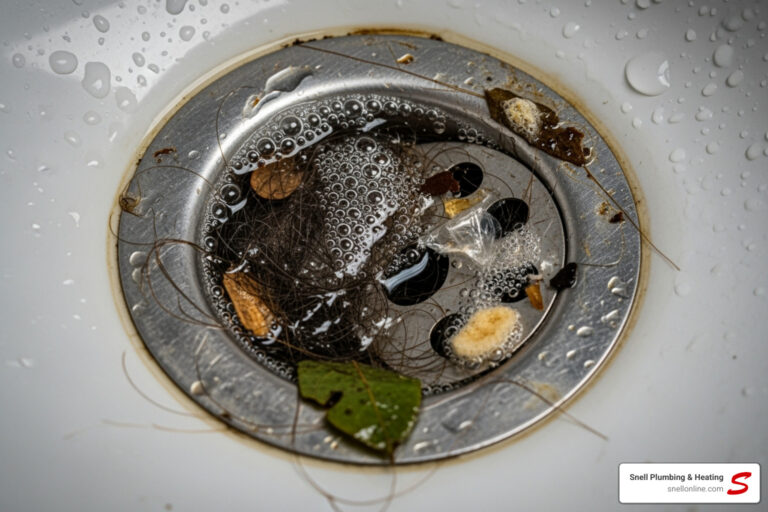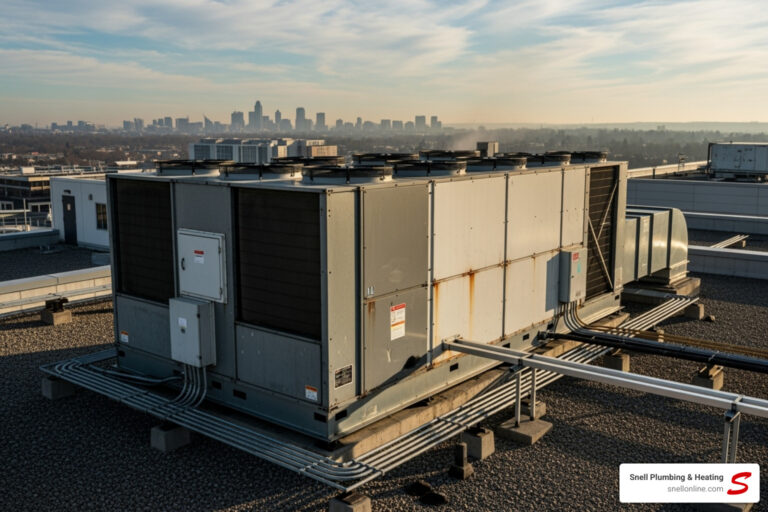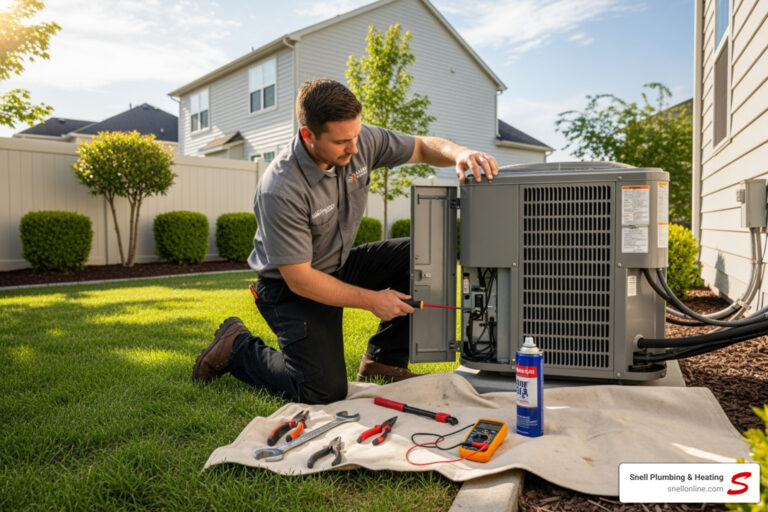Hot summers in Springfield can put any air conditioning system to the test. When the heat rises, your AC compressor works nonstop to cool your home and maintain steady airflow. If it starts to break down, you’ll likely notice changes in comfort, airflow, or utility bills. Ignoring these early signs can turn into bigger problems, especially during peak temperatures when your household relies on cooling the most.
If the AC isn’t performing the way it used to and you’re starting to suspect something’s wrong, the issue might be with the compressor. That part plays a key role in the cooling process. When it begins to fail, it can affect your entire system and may even lead to the need for AC replacement in Springfield. Here are seven signs that could mean your compressor is on its way out.
Unusual Noises From the AC Unit
Any new or strange sound from your air conditioning system can be easy to brush off at first. But what starts as a small noise can quickly point to a developing problem inside the unit. One of the clearest signs of a failing compressor is a sudden change in the sounds your AC makes when it turns on or off.
Here are some noises to listen for:
– Rattling or clanking: These sounds may suggest loose parts or components coming apart inside the compressor
– Hissing: This could be a sign of a refrigerant leak, especially if it happens at startup
– Loud banging or grinding: This often means internal parts have come loose, which can cause permanent damage if left unaddressed
Hearing these sounds once may not mean an emergency, but if they continue or get louder, it’s best to stop using the system and schedule service. Compressors under strain often generate noise before they completely fail. Waiting too long to get a proper diagnosis can lead to more costly repairs.
Reduced Cooling Efficiency
If your air conditioner is running but your home still feels warm or sticky, you could be looking at compressor trouble. The compressor plays a big role in keeping your house cool by compressing refrigerant and pushing it through the system. When this starts breaking down, the entire system loses pressure and performance slips quickly.
Typical signs of reduced cooling linked to a bad compressor include:
– Rooms that take much longer to cool down than before
– Warm spots in some rooms while others are fine
– A steady hum from the unit but no drop in indoor temperature
– Long cooling cycles that don’t seem to reach your target temperature
One Springfield homeowner noticed their upstairs bedroom stayed hot all afternoon, even though the AC ran the whole time. After a visit from our technicians, it turned out the compressor had lost efficiency and wasn’t cycling the refrigerant well enough to cool the home.
If your system seems like it’s working extra hard but doesn’t cool like it used to, the compressor might not be doing its job. The longer it struggles, the more wear it builds, and this can shorten the unit’s lifespan.
Frequent Tripping of the Breaker
Air conditioners use a lot of power when cooling the home, especially in extreme heat. But if your breaker keeps tripping every time the AC starts, that’s more than just a power issue. A worn or damaged compressor could be pulling more electricity than it should, forcing the system to shut off to protect itself.
Here’s why this matters:
– A tripped breaker once in a while might happen. Repeated trips mean there’s a deeper issue
– Overdrawing power increases heat around the compressor, which pushes it closer to burnout
– Electrical strain from a bad compressor can spread and affect other system parts, like the capacitor or motor
Resetting the breaker every time it trips isn’t a solution and could lead to a complete compressor failure if the core issue isn’t resolved. This kind of electrical concern should be checked by our professionals, especially during periods of heavy use. Catching the problem early can help avoid system-wide damage and may prevent the need for full AC replacement.
AC Unit Fails to Start
One of the most frustrating experiences during a heatwave in Springfield is an AC unit that doesn’t kick on. If the thermostat is set correctly and the power is working fine, a failed compressor could be to blame. The compressor is what starts the cooling cycle. When it fails, the whole system might stay silent, no matter how many times you adjust the settings.
A compressor in bad shape can stall the startup in several ways:
– It may make a clicking noise as it tries and fails to engage
– The fan might run, but the unit won’t push out any cool air
– The system could briefly start and then shut down again
When the compressor stops functioning altogether, the AC won’t cool your home. It’s best not to keep trying to restart it. This can cause ripple effects through other system parts like the fan motor or circuit board. Pressing for a restart over and over may push the unit toward more expensive repairs or full replacement. Acting early when startup issues emerge helps keep the damage contained.
Higher Energy Bills Without Explanation
If your energy bills have taken an unexpected jump, one thing to check is how your AC compressor is running. A failing compressor usually has to work much harder to produce the same level of cooling, which translates to increased energy use. In Springfield, where AC systems often run day and night through summer, that kind of inefficiency becomes noticeable quickly.
Watch out for these signs:
– Monthly utility statements that rise with no change in AC settings
– Longer unit run times that don’t match the outdoor heat
– A home that stays uncomfortable even though the system is running constantly
These situations often point to a basic breakdown in how well the compressor is circulating refrigerant. The unit almost starts acting like a fan instead of a true cooling system. If your bill keeps increasing while your comfort level decreases, it’s time to have the compressor checked. Keeping track of energy usage from year to year, especially during summer, can help catch these issues early.
AC Blows Warm Air Instead of Cool
When hot air blows from the vents instead of cold, the result is immediate and uncomfortable. This issue often starts with the compressor. It’s supposed to compress the refrigerant and push it through the coils to cool the air before it enters your home. If it’s malfunctioning, that entire process breaks down.
Here’s what you might notice:
– Warm air coming from vents even though the house is set to cool
– Air that starts cold but turns warm during extended cycles
– A noticeable lack of humidity control that leaves the space feeling sticky
This failure can sneak up on you if you mostly rely on the fan setting or if the system operates on an automated schedule while you’re away. If your AC blows warm air during the hottest part of the day, it’s more than just a comfort issue. It can quickly lead to indoor heat buildup that’s tough to control. Leaving this unchecked raises the chance you’ll need a full AC replacement in Springfield.
Stay Comfortable by Addressing Issues Early
Awareness of compressor-related problems doesn’t just prevent discomfort. It can help safeguard the entire system. Knowing the early signs gives you a better chance to fix small issues before they grow large, expensive, or irreversible. Whether it’s odd sounds, rising bills, or falling performance, these signals shouldn’t be ignored.
Many Springfield homeowners wait until total system failure before acting, which often causes longer delays and higher repair costs during peak season. If your unit is showing any of the signs above, it’s a smart idea to act sooner rather than later. Getting the problem looked at promptly can keep your home cool and your system running longer.
If you notice these compressor warning signs, acting early can help you avoid expensive repairs later. Consider scheduling a professional inspection for AC replacement in Springfield with the trusted team at Snell Plumbing & Heating to keep your system running efficiently all summer long. For a quick estimate or to book a service visit, please contact us today.





